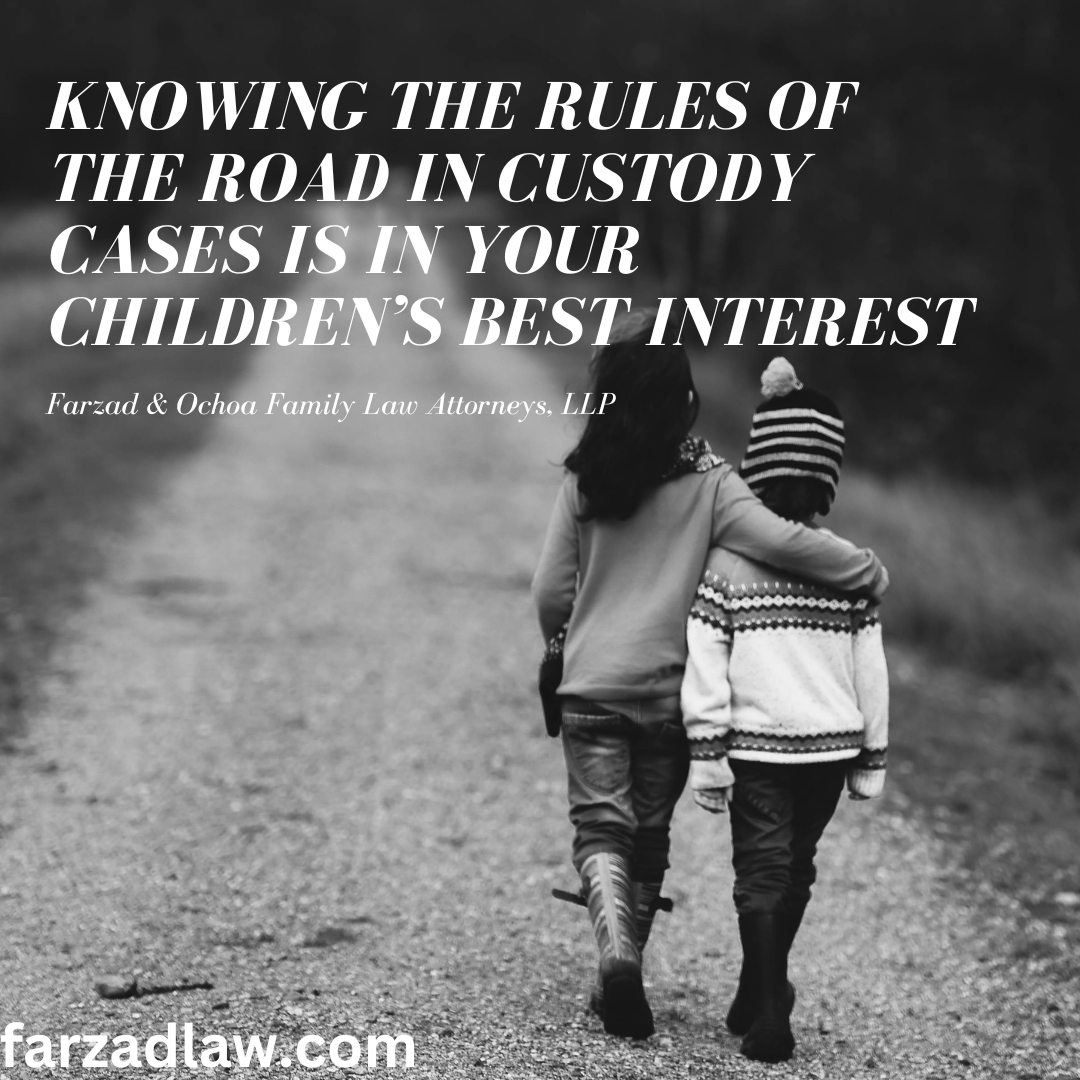Learn About the Most Important California Child Custody Rules
California's child custody rules, found in the California Family Code, emphasize frequent and regular contact with both parents while making orders that are consistent with the child's best interest. Let's take a closer look.
Child Custody Rules: Frequent and Regular Contact with Parents

Although there are exceptions, parents of minor children generally have equal rights to custody unless joint custody is not in the child's best interests.
The State Legislature directs California Family Courts to ensure minor children's health, safety, and welfare in custody proceedings, encouraging parents to share child-rearing responsibilities.
Family Code 3020
Family Code 3020 outlines the state's public policy regarding child custody:
"(a) The Legislature finds and declares that it is the public policy of this state to ensure that the health, safety, and welfare of children shall be the court's primary concern in determining the best interests of children when making any orders regarding the physical or legal custody or visitation of children. The Legislature further finds and declares that children have the right to be safe and free from abuse, and that the perpetration of child abuse or domestic violence in a household where a child resides is detrimental to the health, safety, and welfare of the child.
(b) The Legislature finds and declares that it is the public policy of this state to ensure that children have frequent and continuing contact with both parents after the parents have separated or dissolved their marriage, or ended their relationship, and to encourage parents to share the rights and responsibilities of child rearing in order to effect this policy, except when the contact would not be in the best interests of the child, as provided in subdivisions (a) and (c) of this section and Section 3011.
(c) When the policies set forth in subdivisions (a) and (b) of this section are in conflict, a court's order regarding physical or legal custody or visitation shall be made in a manner that ensures the health, safety, and welfare of the child and the safety of all family members.
(d) The Legislature finds and declares that it is the public policy of this state to ensure that the sex, gender identity, gender expression, or sexual orientation of a parent, legal guardian, or relative is not considered in determining the best interests of the child."
California Family Courts must follow these policies to ensure that children have frequent and continuing contact with both parents post-separation unless it is against the child's best interests.
Applying the Best Interest Standard in Child Custody Cases
The "best interest" standard is broad and includes several factors. Here are some of the most important.
- Health: Which parent is more willing and able to care for the child's health needs?
- Safety: Is either parent a danger to the child or has a history of dangerous or neglectful behavior?
- Welfare: Has either parent interfered with the child's general welfare and upbringing, including education?
- Interference with Parenting Time: Has either parent interfered with the other parent's parenting time?
- Abuse: Has either parent been abusive, physically or emotionally, to the child?
- Absence: Has either parent been away for a lengthy duration, making the other the sole caretaker?
- Substance Abuse: Does either parent have a history of drug addiction or alcoholism?
The Relevance of Status Quo in Custody Cases
Judges consider the "status quo," or the historical parenting roles and past conduct, in custody decisions. Stability, routine, and predictability are particularly important for younger children. However, temporary relocations (as often happens at separation) should not be held against the parent whose time was limited due to the relocation.
Family Code 3046
Family Code 3046 addresses temporary relocations:
(a) If a party is absent or relocates from the family residence, the court shall not consider the absence or relocation as a factor in determining custody or visitation in either of the following circumstances:
(1) The absence or relocation is of short duration and the court finds that, during the period of absence or relocation, the party has demonstrated an interest in maintaining custody or visitation, the party maintains, or makes reasonable efforts to maintain, regular contact with the child, and the party's behavior demonstrates no intent to abandon the child.
(2) The party is absent or relocates because of an act or acts of actual or threatened domestic or family violence by the other party.
(b) The court may consider attempts by one party to interfere with the other party's regular contact with the child in determining if the party has satisfied the requirements of subdivision (a).
(c) This section does not apply to either of the following:
(1) A party against whom a protective or restraining order has been issued excluding the party from the dwelling of the other party or the child, or otherwise enjoining the party from assault or harassment against the other party or the child, including, but not limited to, orders issued under Part 4 (commencing with Section 6300) of
(2) A party who abandons a child as provided in Section 7822."
The Judge's Focus on the Child's Best Interest
Family law judges prioritize the child's best interests over the parents' desires. The court's role is not to reward or punish parents but to ensure the child's well-being.
Conclusion
Understanding and navigating California's child custody rules can be complex. Our skilled family law lawyers are here to help. Contact us for an affordable strategy session.
For a more detailed look at California child custody, check out our comprehensive guide on California's child custody laws.
Your Strategy Session
About your strategy session
Southern California Offices
Locations
Our Services and Fees
Frequently asked questions
Strategy sessions are designed for the serious parent. We know how important your children are to you. Their health, safety and best interests are our priority.
